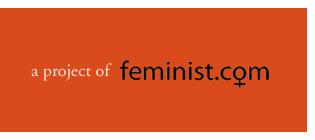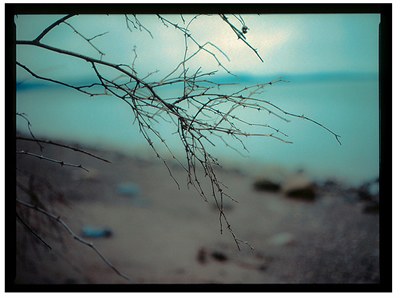 |
 |
Loving Your Tree
What better way to find sanctuary than to become it? A long time ago, my mother made a casual remark that if she were to have plastic surgery anywhere, it would be on her hands, where the veins bulge and the skin broadcasts its age unmistakably. As I watch my fingers move across my computer keyboard, I look at my hands and see my mother’s. But I also remember walking in the woods a few years back on a bracing, wet day, colors and shapes in sharp relief. I was focused on the next step, on not tripping in the web of tree roots, when I suddenly recognized that the veins in my hands looked just like the roots at my feet. Something shifted in me the day that I saw veins as tree roots. I started seeing stretch marks in rivulets skimming the sand, cellulite in cloud formations. In her book Refuge, Terry Tempest Williams describes dunes: “Wind swirls around the sand and ribs appear. There is musculature in dunes. And they are female. Sensuous curves—the small of a woman’s back. Breasts. Buttocks. Hips and pelvis. They are the natural shapes of earth. Let me lie naked and disappear.” These days, at age 50, I am slightly obsessed with the variety and beauty of tree bark, by the fact that the smoothness of a sapling is no more beautiful than the ridges and folds in the bark of a mature tree. That’s why I was so struck by The Good Body, a new one woman show by Eve Ensler (of The Vagina Monologues fame). In one particularly powerful scene, Ensler asks the character Leah, a 74-year-old African woman, if she loves her body. “Oh, yes,” answers Leah. She describes what she loves about her body, including the moons on her fingernails. She goes on to point to one tree and then another. “Eve, is one of those trees more beautiful than another? You must love all the trees, and you must love your tree.” This affirmation of variety in beauty is juxtaposed against other vignettes in the play: women who sap their power and joy with their bodily self-loathing, with dieting and plastic surgery, women like all of us in the audience who laugh and weep with recognition. Particularly when Ensler exposes her stomach—the particular locus of her sense of shame—which she says is the most “glorious” part of each performance, because “it represents all of me in my complexity.” On the day after I saw the play in mid November, I talked with Eve, the two of us curled on either end of a red couch in her Manhattan apartment, which is simultaneously a womb and an aerie, both peaceful and fiery, an apt reflection of Eve herself. I asked her what role spirituality plays in her life. She told me that she spent a year going to churches and temples and every other kind of place spiritual practice was going on, finding herself drawn to aspects of Islam, Judaism, and Hinduism. Ultimately, she found all monotheism antifeminist because, she asks, “With one god, are women ever included in the agenda?” The right path has to be individual, the one that “moves the currents of your soul,” she says. “I needed something active, so 15 years ago I found a Buddhist practice where I chant. Finding a practice was central to my happiness. There is a part of me that moves to self-destruction, to collapse, if I don’t cultivate life force.” We talked about how our bodies have the capacity to hold rage, sorrow, joy, all together. But when we shut down and label feelings and reactions—or bodily parts—wrong or bad or frightening, we stop our breath and energy and, along with them, our ability to respond creatively and powerfully in the present. So much about what passes for beauty in our culture is shut down and tidy—as opposed to what Eve calls “messy-gooey beauty, the richness of a sorrow that we can’t control. I’ve seen awful things—refugee camps, burned women, skulls on riverbanks--but I have a clarity of purpose that came from my practice (to end violence toward women), which allows me to see all that and keep going.” Capitalism, pushed to its extreme, she says, ends up as a “malignant or atrophied narcissism where you become so self-focused that you are just a commodity that needs to consume to exist. The antidote is service. We need to truly devote ourselves to others.” We serve, not to be good, Eve insists, but because service is the only antidote to self-hatred. When people praise her for all the good she’s done (thousands of performances of The Vagina Monologues have raised over $25 million to prevent violence toward women all over the world), she says, “I’m not noble; I take care of me. Building a safe house in Africa benefits me.” In conjunction with her play’s run in New York, ABC Carpet & Home in Manhattan is hosting the Love Your Tree Project, a series of talks and programs based on themes raised by the play. I’ll be speaking there about “The Good Body Politic: How Loving Your Body Can Help Change the World.” My friend Zhena Muzyka will be serving fair trade gypsy tea; there will be belly dancers of all ages, sizes, and colors. In my mind, all of this connects to our sense of busyness and stress, our yearning for sanctuary. The fundamental place we need to find sanctuary, both physically and emotionally, is in our own bodies and in their connection to the earth. What better way is there to find sanctuary than to become it? As long as we judge ourselves and resist the discomfort of “messy-gooey beauty” we restrict our life force and, along with it, our ability to take effective action. “Activists are my role models because they transform destructive energy,” says Eve. For her, such transformation is at the heart of beauty. Written by Nina Utne. This article originally appeared in Utne Magazine. Nina Utne is Chair and CEO of Utne Magazine.
|
||||
Home | About Us | Features | Ask
Our Team | Inspiration
& Practice | Women of Vision | Resources
Copyright 2010 Feminist.com. All rights reserved.
